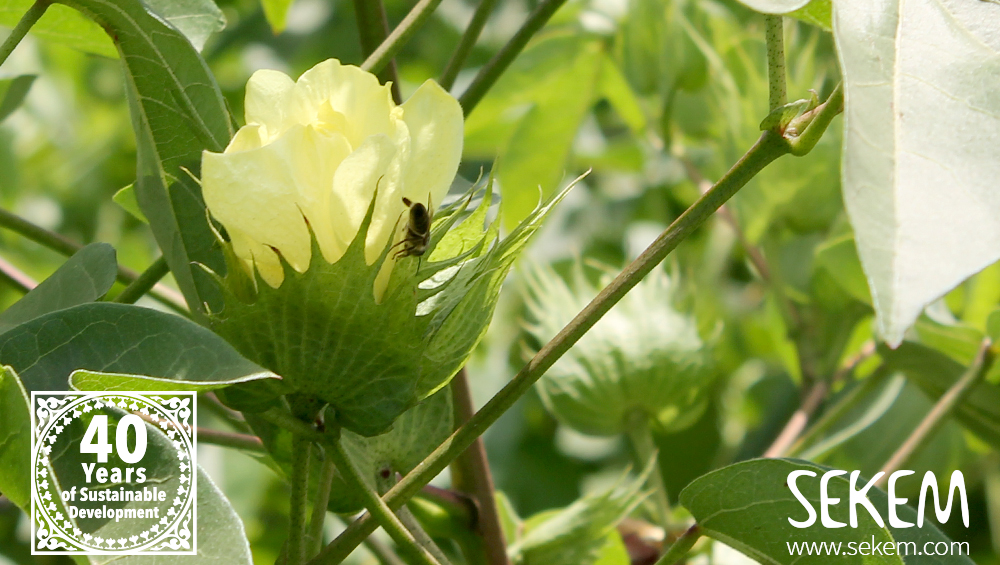After a successful yield of Organic cotton that SEKEM celebrated last year, the pioneer of Egypt’s organic cotton collaborates again in 2018, with the United Nations Industrial Development Organization (UNIDO) in order to promote a sustainable value creation of Egyptian cotton.
Under the title “The Egyptian Cotton Project”, UNIDO is leading a joint project with the Egyptian ministries of Trade and Industry, and Agriculture aiming to promote organic and non-contaminated long and extra-long staple (LS and ELS) Egyptian cotton by improving the economic, social and environmental performance of cotton growers and processors and strengthening support institutions. With a total budget of 1.5 million Euros, funded by the Italian Agency of Development Cooperation (AICS), the project aiming to advance competitiveness and demand by international markets, prioritizes aspects of sustainability, inclusiveness and value addition of the Egyptian LS and ELS cotton value chain. SEKEM supports this promising initiative with its experience as a pioneer of sustainable cotton farming and production in Egypt.
“Our target is promoting the sustainability of cotton industry in Egypt. This should start from the cotton farmers by raising their awareness towards the right procedures,” says Hazem Fouda, the National Cotton Expert of UNIDO. “The project encompasses a capacity-building strategy for both, conventional and organic cotton farmers. That shall improve their environmental performance, spread the motivation of cultivating organic cotton and hence sustain the Egyptian cotton.” A continuous follow-up along the whole cultivation cycle is planned to be conducted with around 400 cotton farmers in Damietta and Kafr ElSheikh Governorates. The cooperation protocol also covers improving the skills of 300 workers in the textile industry as well as offering training programs to 300 technical students in this field.
Experience exchange for a sustainable Egyptian cotton
As part of this cooperation, SEKEM holds a series of workshops on sustainable cotton cultivation for 80 conventional farmers and 20 other farmers who already follow the organic guidelines. SEKEM’s contracted farmers in Damietta and Kafr El-Sheikh have been selected to host these workshops on their farms for their conventional neighbors as they are well experienced with organic farming methods. Agricultural professors, experts, and consultants from NatureTex and SEKEM’s Company for organic textiles are going to offer practical sessions.
A workshop on biological pest control was hosted on the farm of SEKEM’s farmer El-Seddik Rashad, in Damietta last July. More than 40 cotton farmers participated and received insights into the Biodynamic procedures of saving their precious crop from insects and pests, by using predators and parasites instead of chemicals and pesticides. “I am glad that my conventional counterparts attended the workshop and got encouraged to start Organic cotton farming in the coming season,” says Rashad.
International cooperation for a common goal
The project leverages on the ongoing “Cottonforlife” CSR initiative lead by Filmar Group and funded by Alex Bank (of Intesa Sao Paolo). The initiative fosters a sustainable cotton value creation on various levels. Last year, Filmar Group became a partner of SEKEM by integrating SEKEM-cotton in its collections. SEKEM actively supports such initiatives with a deep belief that a real transformation towards a sustainable future would never be possible without cooperation and partnerships.
Currently, around 380 of SEKEM’s contracted farmers are cultivating a total area of more than 390 hectares (967 feddans) of Egypt’s land with organic cotton crops – located in Damietta, Kafr El-Sheikh, Behera, and Fayoum. SEKEM together with its committed farmers, partners, and friends is looking forward to celebrating this season’s organic cotton harvest as they did last year.
Noha Hussein
SEKEM Celebrates Harvesting its Organic Cotton in Damietta and New Cooperation
Egypt’s Organic Cotton Pioneer Guarantees a Closed Value Chain
Organic Cotton as a Sustainable Alternative

